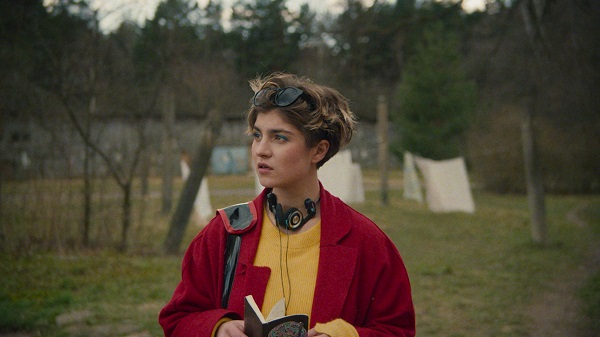
Velya (Alina Nasibullina), a Madonna lookalike, overhears her mother Tamara (Svetlana Anikej) complain to a friend over the phone. “Everything is on me,” Tamara says. Regular jobs are different come by in Belarus in 1996. The difficulties of becoming a lawyer turned DJ, which is what Velya aspires to be, is doubly difficult. It’s probably easier to be a DJ in Chicago, so she applies for a visa. In her application, she pretends to be a worker in a factory for crystals in a fictional small town, Crystal. The thing is is that she writes the wrong phone number on her application. And it’s probably a bad idea to go back and change the number there. So she takes the bus to Crystal. There, she tries to convince the family who owns that number to pretend to be the factory.
Much of Darya Zhuk’s Crystal Swan follows Velya and her Americanized values that clash against the people of Crystal. But sometimes, it returns to the two people whom she leaves behind – Tamara and Velya’s best friend Alik (Yuriy Borisov). There’s not a lot to Alik and I’m kind of not mad at how paper thin it makes his addiction issues because it at least gives a lot of meat to Tamara’s character. Tamara is a woman with some contradictions. She runs a museum of Belarussian history and she practices yoga. She represent that little bit of globalization within a nationalist exterior, and her unwillingness to see Velya’s need to leave makes no sense, but it’s the right amount of cognitive dissonance that still makes viewers empathize with her.
Velya’s journey to leave Belarus feels circuitous but at the risk of sounding like a meme, it’s all about the people she meets along the way. First viewings of Crystal Swan makes it feel like its major conflict is between Velya and the family’s elder son Stepan (Ivan Mulin). It feels then like it’s tacking on her friendship with the family’s youngest son Kostya. But repeat viewings reveal the breadcrumbs that the film leaves to make that third act work. Their bonding over house music has a strange emotional effect. And yes, it feels stereotypical that a child character is the most malleable to ideas, that the insularity of his surroundings doesn’t destroy him yet. But the film makes that stereotype work as well as strengthens Velya’s resolve to do what she deems necessary.
There are a few nitpicks that still bug some of the people who saw Crystal Swan. These are valid nitpicks even if they’re not mine. Some reviews warn of a tonal shift, which is euphemistic for a plot point that viewers can see from when Velya sets foot on Crystal. But I didn’t mind that plot point because that’s when the film finally decides on its trajectory. My nitpick is its obvious references to Akerman, the food preparation, the shower scene. There are also moments where the film, which occasionally feels very Belarussian Woman in the Dunes, anthropologizes its own culture. But what saves this film is how active its major characters are, as they eventually show viewers how they take control of their fates.
Crystal Swan comes soon on OVID.


